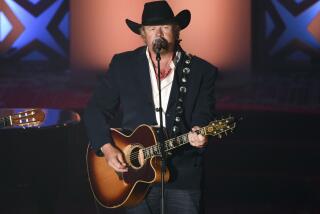Hooting for Him
- Share via
Literate. Insightful. Witty. A songwriter’s songwriter.
That’s the rap sheet on Texas troubadour Robert Earl Keen.
So who was that guy onstage Monday at the Crazy Horse who kept spurring a rapturous Irvine crowd to hooting and hollering more befitting a sing-along with Toby Keith’s anthem to emotional retribution, “How Do You Like Me Now?!”?
At times that boisterous response seemed at odds with the inventive, detail-rich yarns of Western outlaws and loners that have made Keen a celebrated cult figure, particularly among his fellow musicians.
But in addition to the short-story-quality epics his reputation is built on, Keen has spent enough time in barrooms and honky-tonks to have a thorough grounding in entertaining a crowd, which is exactly what he did even in the Crazy Horse’s upscale Irvine Spectrum surroundings.
He did it with a raucous rendition of the whimsical “The Five Pound Bass,” a rave-up run-through of “Amarillo Highway” and the delightfully ribald wordplay of “That Buckin’ Song,” one of a handful of numbers from his most recent album, 1998’s “Walking Distance.” (Among the latter song’s many charms is a droll “Yippee yi cy yey” chorus that sounds like nothing so much as Ben Stein yodeling.)
The juxtaposition of humor and gravity is something Keen and all great writers understand. It’s why he can move from a song of vanished love as stunning as “I Wonder Where My Baby Is Tonight (“I love her more than roses love the sun”) to his gritty ode to chewing tobacco (“Copenhagen”) without sounding as though he’s suffering from a split personality--just one that honors life’s ups and downs.
*
Keen didn’t attempt a full-on presentation of his latest album’s ambitious song cycle that explores the many facets of traveling down life’s long and winding road. Instead, he interspersed his newer songs among nearly two dozen spanning his 15-year recording career.
But then, most of his music has centered on people on the move, whether they’re careening through life (the nonchalant murderer at the center of “Whenever Kindness Fails”) or emerging wizened from some unspoken trials (as in the gently upbeat “Feelin’ Good Again”).
His four-man band prizes subtlety and restraint, qualities that don’t normally surface for long in honky-tonks. But that ability enabled “Feelin’ Good Again” to get the show started with an easy shuffle and to bring out the emotional complexities in “Shades of Gray,” his tale of two outlaw brothers.
Fiddler-mandolinist Bryan Duckworth got the spotlight in “Ding Dong Daddy,” a swinging fiddle tune from Duckworth’s recent solo album, and guitarist Rich Brotherton consistently added colorful fills and solos behind Keen’s rhythm work. Bassist Bill Whitbeck and drummer Tom Van Schaik were models of versatility in scooting from country shuffles to Cajun two-steps to raving rockers.
*
Certainly Keen’s profile has heightened and he’s gotten more airplay, mostly on Americana format stations, since he signed in 1997 with a major label, Arista Austin.
But don’t expect Keen ever to join Toby Keith or the other country-rock pinup boys who regularly turn up on TV specials and awards shows.
Keen remains an exceptionally ordinary-looking fellow--in his long-sleeved light blue shirt and bluejeans, he came across Monday night like a 150-pound lighter John Goodman who just strolled in from a county road crew. And he lacks the kind of voice that draws attention to itself--his is as flat and dry as a West Texas plain, but somehow also as hypnotic as that unending landscape can be.
Keen’s pen, however, makes him a poster boy to anyone who values songs that open a window on lives dramatically different and frighteningly similar to their own.
More to Read
The biggest entertainment stories
Get our big stories about Hollywood, film, television, music, arts, culture and more right in your inbox as soon as they publish.
You may occasionally receive promotional content from the Los Angeles Times.







